The heroes are back underground, but this time they have a fancy new airship. They fly to the dwarves’ castle and inform the king of the current situation.
Accepting You
 |  |
| Final Fantasy IV (Super Famicom) | Final Fantasy II (Super NES) |
The last crystal is stored inside the Sealed Cave, and you need a special key to get inside. The Japanese script has an extra little detail that’s absent in the English script, though:
| Japanese Version (basic translation) | English Translation |
| The cave will accept absolutely no one without it! | No one can enter the cave without it! |
In other words, the Japanese text suggests that the cave has some level of cognition or agency. It’s not just a standard lock-and-key system, basically. Which makes sense, given that all the doors inside the cave are alive, and a giant wall in the cave comes alive to try and kill the heroes.
Flotation Advice
 |  |
| Final Fantasy IV (Super Famicom) | Final Fantasy II (Super NES) |
A dwarf explains that there’s a secret cave somewhere in the Underground. The English script adds an entirely new window of text that explains how to safely navigate the secret cave once you get inside:
| Japanese Version (basic translation) | English Translation |
| Rumor has it there’s a cave somewhere here in the Underworld that leads to the Genkai! | There is a cave that leads to the world of summoned monsters! |
| You can’t walk inside of that cave! You have to float! There is a magic to float! Can you use it? |
This additional text isn’t in the Japanese Easy Type script either – it’s completely unique to the English release. I wish I could peer back in time and see who made the decision to add this text, and why specifically. My best guess is that some testers or focus group people had major problems getting through the cave.
Lava and Magma
The Underground is filled with an “ocean” of hot, molten rock. In Japanese, the word used for this molten rock is ようがん (yōgan), which can be translated as “magma” or “lava”.
The thing is, in English, there’s a difference between magma and lava. The easiest way to remember it is “magma = “mass”, and “lava = liquid”. Magma is the molten rock that’s found deep underground. Lava is what flows up into volcanoes and spurts out from the ground.
Despite this technical difference, it’s common to see “magma” and “lava” mixed up and used interchangeably. This can even be seen in the English version of Final Fantasy IV:
The confusion kind of makes sense in this case, though – since this entire place is already deep underground, what should the molten rock be classified as, lava or magma? Out of curiosity, I checked the other English translations, and most of them appear to use “lava” and “magma” interchangeably. The DS version seems to stick to “magma”, though, and the J2e fan translation seems to stick with “lava” instead.
Anyway, none of this is a huge deal or anything, but I bring it up because it’s a good example of how a single word in one language can encompass the meaning of multiple words in another language. When a situation like this arises, a proper translation absolutely requires context, otherwise all you can do is make an educated guess.
Underground Reunion
Edge and Cid meet for the first time, and almost immediately their personalities collide. In Japanese, Edge calls Cid a “geezer” or “old fogey” right off the bat. In the Super NES translation, he instead calls Cid a “chap”:
 |  |
| Final Fantasy IV (Super Famicom) | Final Fantasy II (Super NES) |
| Japanese Version (basic translation) | English Translation |
| Edge: Who’s this geezer? | Edge: Who’s this chap? |
| Cid: Geezer!? You rude jerk! | Cid: Chap!? You impertinent brat! |
| Edge: YOU’RE the rude jerk, geezer! | Edge: Who do you think you’re talking to? |
This change to “chap” seems odd to me – there are plenty of insulting words in English for “old man”, but “chap” certainly isn’t one that comes to mind. From my own experience, I know it’s sort of equivalent to “fellow” in some countries, and maybe “lad” in some smaller regions, but I don’t think I’ve ever seen it used to mean “old man”. But maybe that’s just my lack of knowledge of the word.
| Japanese Version (basic translation) | English Translation |
| Cid: Who is this smartass? | Cid: Who is this little nuisance? |
| Edge: Heheh! I’ll have you know I am Prince Edge the Great! Nice to meetcha, geezer! | Edge: I’m Edge, the renowned Prince of Eblan! |
| Cain: He talks rudely but it he apparently really is a prince. | Kain: He is a Prince, though his mouth betrays his nature. |
| Edge: Don’t forget handsome! And skilled! | Edge: And handsome, skilled Ninja as well! |
In the above exchange, Edge uses the Japanese pronoun ore-sama, which gives off a very over-the-top, “I am so great” vibe. There’s no perfect way of translating it into English, though, since we only have “I” and “me”. This is why I’ve added “the Great” in the sample translation above, and why the official translator added the word “renowned” into the Super NES translation.
Interestingly, the PlayStation, Game Boy Advance, and DS translations simply leave ore-sama as “I”, without trying to further convey the nuances of the Japanese pronoun. Perhaps the translators felt that Edge’s dialogue in general already conveyed the “I am so great” feeling well enough that further embellishment was unnecessary. Incidentally, the J2e fan translation goes with “the great”.
Rydia interrupts to stop the argument. Then Cid makes a certain remark:
| Japanese Version (basic translation) | English Translation |
| Rydia: Can’t you see the man is clearly injured?! Don’t get him worked up! | Rydia: He is injured! Don’t anger him! |
| Cid: Oh? Rydia’s got you henpecked, huh? | Cid: Henpecked, boy? |
| Edge: Sh-shut up! | Edge: Oh, shut up! |
Cid says “henpecked” in the translations above, but the actual Japanese phrase is an idiom that literally means “to be laid out under someone’s rear” or more loosely as “to be used as a seat cushion”. Like this, basically:
Functionally, this Japanese idiom equates to English phrases like “henpecked (by your wife)”, “completely dominated (by your wife)”, “under your wife’s thumb”, and such.
I only bring this topic up because it’s an interesting idiom in Japanese and I was curious to see how it was handled in different translations. Here’s what I found:
The official translations handle the idiom in different ways, while the fan translator seems to have focused on the “rear/butt” part without understanding the whole picture.
We’re Old
 |  |
| Final Fantasy IV (Super Famicom) | Final Fantasy II (Super NES) |
Despite his serious injuries, Cid offers to renovate the heroes’ new airship. His nurses are very opposed to the idea, however:
| Japanese Version (basic translation) | English Translation |
| Dwarf: Old man! You need to stay in bed! | Dwarf: You must stay in bed, Lali! |
| Dwarf: Wait until your wounds heal! | Dwarf: Wait until you heal, Lali! |
| Cid: You guys are old men too, you know! This is no time to just sit around and blabber! You guys are gonna help me! | Cid: Oh, shut up and help me remodel the airship! We have no time to waste! |
In the Japanese script, one of the nurses calls Cid an old man. Cid takes offense to this and responds that they’re old men too. He then forces them to help renovate the airship.
In the English script, the insult about being old was dropped, so Cid no longer takes offense at being called old. This change, along with the “chap” thing above, make me wonder if these “old man” insults were intentionally altered during the translation. It could just be a coincidence, though.


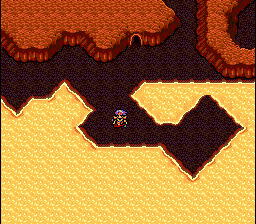
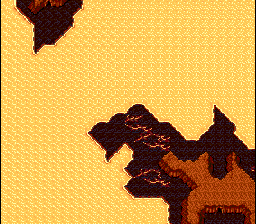


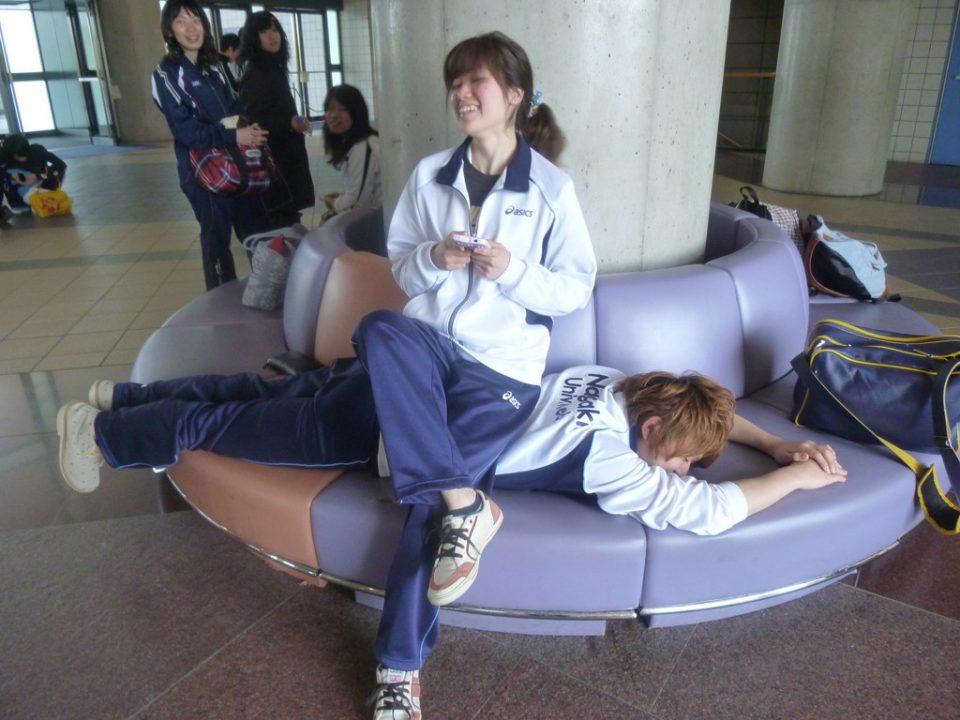

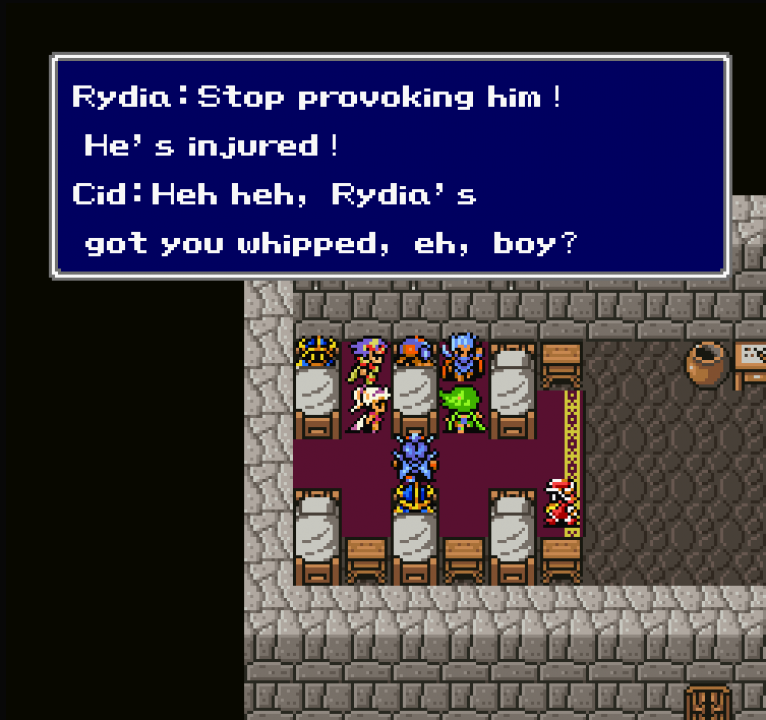
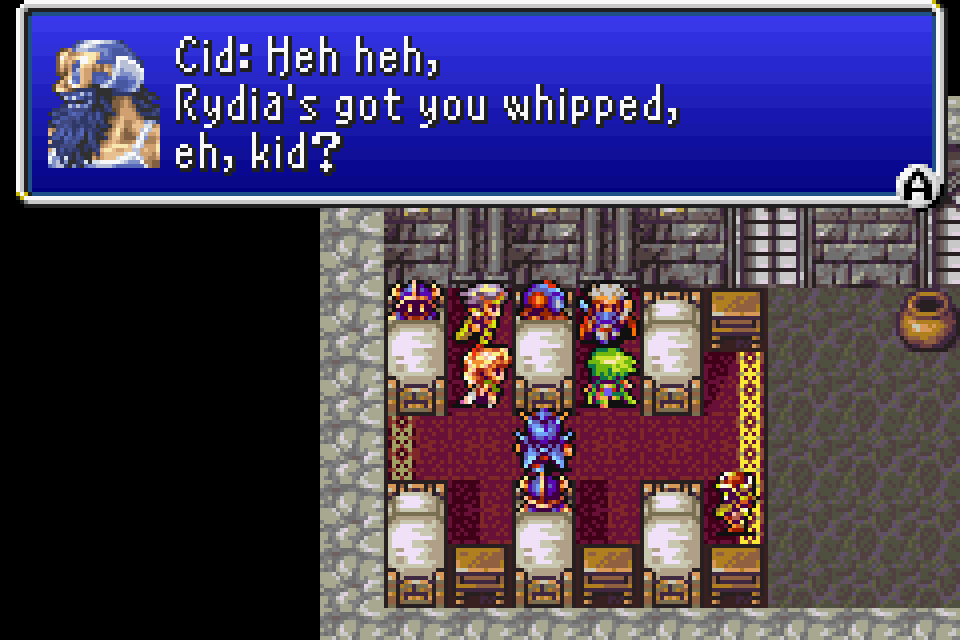
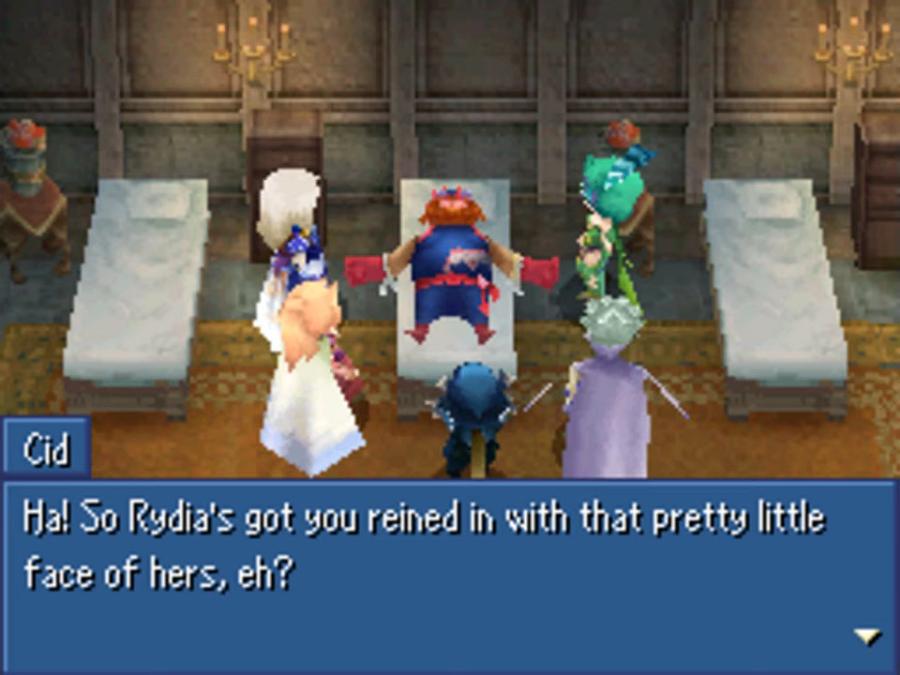
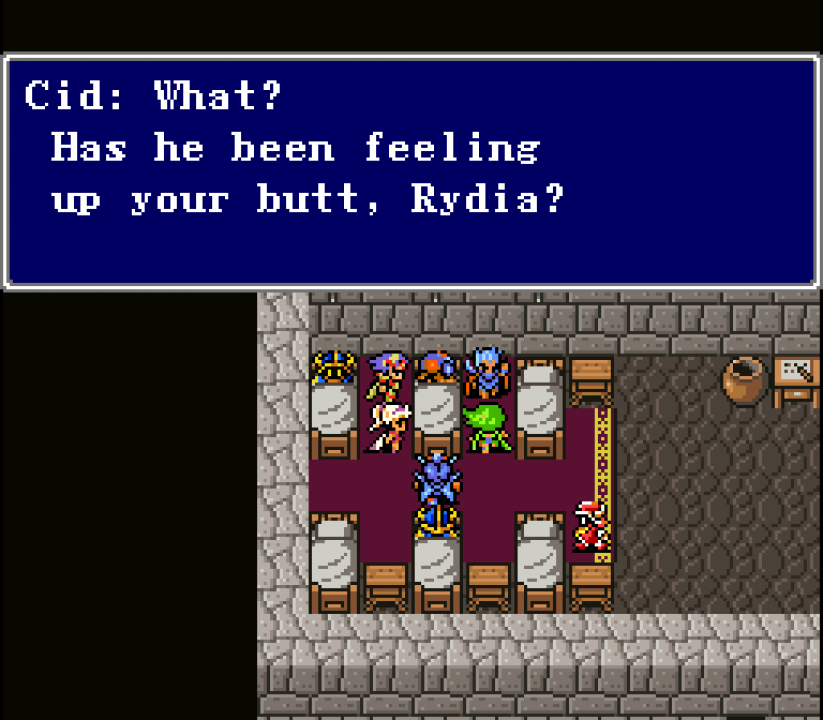
![press start to translate [Final Fantasy IV] press start to translate [Final Fantasy IV]](https://legendsoflocalization.com/wp-content/uploads/2019/08/bbenma.png)
The Float hint did little good to me. I’m pretty sure Rosa was too low level the first time I played and I don’t think I realized right away that I was supposed to use the spell when I got it. I ended up dumping huge amounts of MP on healing. The Sylph cave in particular was brutal in my youth, even in replays.
Something interesting about the magma/lava is that walking is disabled on partial tiles, whereas partial ocean tiles were accessible. It makes sense. A partial ocean tile is “the beach” while a partial lava tile is “probably melting”. Still, there is pretty much no way the underworld wouldn’t be too hot to support human life and be full of noxious gas to boot so it’s best not to think too much about it.
I never thought about it before, but the English text makes it sound like the underworld being flooded with lava/magma is a new phenomenon, and there used to be way of traveling from the castle to Tomra safely somehow. I don’t think anything explains why that would have changed, though.
I suspect it’s just RPG-ese, where townspeople are suspiciously knowledgeable about the treasure at the bottom of the cursed cave filled with monsters and eager to tell strangers. The lava’s always been around and the townsperson’s never been there. Doesn’t really make any sense to the setting, but useful knowledge for the player.
So just like with alligator and crocodile, the Japanese only have one word for both lava and magma. Seems kind of dishonest from a scientific perspective though. There are differences in both examples, but then again Turkish only has one word for gators and crocs, but separate words for lava and magma.
Hang on.. If Mato is reading this or someone who can answer, I would like to bring up that Alligator/Crocodile thing.. I take it you mean ‘Wani’ but wasn’t Wani an older word which more means like a lizard monster/dragon/sea monster thing.. Which CAN be used for Crocodile or Alligator, but for the creature type, there are also words for each one? Wani is just kinda used generically more then for the creatures themselves? like how, it seams rare but does happen, Wani can be used for Godzilla at times for basically saying he is some kinda semi-lizard like monster?.. not 100% sure but.. yeah..
also, most languages have a huge problem when it comes to stuff that they don’t encounter that much. The more common it is, the more words for it to show differences. Wani is one of the Chinese common word things and they have a few words for Alligators which are found in china..
As far as I know, “wani” is used for both alligators and crocodiles. They could really just go with アリゲーター and クロコダイル for separate terms instead of just 鰐, and I have noticed heavier use of the katakana terms more than the kanji in some recent stuff. As for what you said, I have never heard of wani being used to describe scaly monsters before. I think they call Godzilla that in Japanese as kind of a derogatory term since he’s a giant monster that swims like crocodilians do.
I know it is used for both but I’ve seen it only really used when there is a bit more generic.. but then, it’s probably looking at more recent stuff in the way of the last 30 years or so or maybe more recent.. a bit limited on some stuff that uses it ^_^ though I’m sure I’ve seen it as a kinda derogatory term for Godzilla. and interesting, I think there is an story from the .. ‘what the hell is that’ Marvel comics Godzilla which they have lost the rights so they changed Godzilla into a generic lizard monster and called him ‘Wani’ when they printed in it.. one of there titles..
So, this is actually why scientists use Latin binomial nomenclature to describe animals: because translating terms between languages gets messy, especially with things like plants and animals.
For instance, both “rat” and “mouse” are ネズミ (nezumi) in Japanese, even though to English speakers we make a point of having two different words. Conversely, in Japanese, they have both トンボ (tonbo) and ヤンマ (yanma) to refer to different insects that in English would both just be “dragonfly.”
So “Genkai” in this context is 幻界? I recall the library in Genjū Town is called the Genkai Library. But I guess you otherwise will cover it when we get there. Always nice to see new FFIV updates!
I finally got through this game myself last week, and just read through all the FFIV articles, and now there’s a new one! What luck.
I played the GBA version, and I definitely got the impression that Rydia still talked and thought like a child even after becoming magically grown up. It was mainly because of how she reacted to things and spoke in a kind of simple but impassioned way, if that makes any sense. Reading through all the articles though, it looks like that’s not the case in the original Japanese or English SNES releases. It might also just be me imagining things, I suppose.
She wasn’t like, ‘magically grown up’ or anything. From her perspective she really had been living on for years after the shipwreck.
Saying “chap” is most certainly like calling someone “fellow”, so treating it like an insult is very bizarre. “Geezer” would’ve worked well and I doubt would constitute strong language to Nintendo of America!
Could the “to be laid out under someone’s rear” idiom be equivalent to being called a “doormat” in English, or is it very specific to husband/wife relationships? Either way, I thought “henpecked” was a kind of unusually uncommon term for the English translation. I know it exists as a word, but I’ve never heard someone in real life say it. Might be kind of dated by today’s standards; the reference to being “whipped” is a lot more apt.
The fan translation misinterpreting the line to be about feeling up Rydia’s butt was pretty hilarious, regardless.
The “whipped” word choice is pretty great, given Rydia uses whips as a weapon.
It definitely is starting to feel like Edge got changed from boisterous kid (A.K.A. a shonen staple trope) to an entitled rich kid in the localization. I’m not sure it’s a bad change necessarily, but it really seems like he’s a different person. I wonder if it was intentional, perhaps to make him seem less rude to an American audience, or just an accident of the rough translation issues. I’m pretty curious to see where it goes from here!
And yet, he’s the oldest member of the final party.
I used to have a paperback J-E dictionary that included “chap” as a translation for “oyaji,” which I suspect is a relic from British English of the 19th and early-to-middle 20th centuries, where “old man” and “chap” and “my good fellow” were all just forms of address between male friends.
Recently came across this series, and I’ve definitely enjoyed reading it. I loved this game growing up, and I still regularly replay it (though now on the GBA.)
So you can imagine my disappointment to find it’s been 2 years without an update! I hope you get the chance to finish it out some day.
I wanted to post this on the “Final thoughts” page, but in case there’s not more updates to this, I’ll do it here.
I’ve only ever played the French GBA version (on emulator), and upon reading this series I was surprised at the differences with my memories. As it turns out, the GBA version is not the first to be released in Europe (the PAL version of Final Fantasy Anthology contained IV and V, instead of V and VI in the NTSC version), but it IS the first translation in European languages other than English. So I thought I’d compare them! I replayed the game up to the town of Baron with the EU rom simultaneously in French, English and the other two languages I can somewhat read, German and Spanish (sorry, Italian). Also the US-Australia version for good measure. Then I unearthed my 2007 .SAV file to check some of the late-game NPC dialog (at this point I gave up on the US release, though).
Based on those two samples, my conclusion is that all three continental version are based on the English European version. I’ll spare you the nitpicky stuff regarding the many differences I found, but:
– Said differences are too minimal for those versions to be translated directly from Japanese; which is odd, because in 2006 the main games had been translated directly for years (VIII had a proper Japanese-to-French localization for example). Maybe it was cheaper to work from English?
The most blatant example is in Agart, where as noted by Mato two NPCs have lined copy-pasted from others, with a slight variation in one of them (“…, called Magma” versus “… which is called Magma”): it’s the exact same in French and German, the variation included (maybe the Spanish translators couldn’t find a way to do the same?).
– The scenes untranslated in the SNES release, like when Kain speaks of his father, were added back for the first time in the GBA version; they’re translated the same everywhere.
– Wherever the GBA English version deviates from the PlayStation version, so do other GBA translations. For example, also in Agart, there’s the guy who says “Protecting her from all the frogs and pigs…” on PlayStation but “I have to protect her from all the scum out there!” on GBA. The other versions follow the English GBA one, no mention of frogs or pigs.
– I found a mistake on the US version! Early on, Kain tells Cecil “We will rejoin the Red Wings in no time” when based on context it should be “You will”. The European English version corrects this, as do other translations. This is the only difference I could find between the two English versions, so I don’t think it’s a definite proof of which one was used as a base?
– Of all three translations I checked, the German one is the most faithful to the English “original”. The other two deviate a bit more, the Spanish one more often; it tends to add little things here and there (like Uematsu in the dev room calling you “little grasshopper”) and once in a while a line is different, like when Rosa tells Cecil “You and I both know that would never happen.”, and in Spanish it becomes “I will never allow that to happen.”
Whenever the French version deviates, however, it’s more often by omitting things, which can’t really be explained by space constraints (it’s not like Spanish is more concise). It also has the worst formatting of all versions. All versions add little quirks here and there though.
– Still, some parts seem to have been edited compared to English. In the dev room, someone identified as “K. Adachi (Menu Programmer)” is present twice in English, probably by mistake. In all other versions, one of the two is replaced by “T. Endo (Newbie)”. Also, the Spanish version is the only one to turn the Twin Harp back into a plant? Most little differences between versions can plausibly be the result of final editing.
– The French, German and Spanish versions made different choices for nuances that don’t exist in English, such as the T–V distinction (the level of politeness in the pronouns used when adressing someone). It makes it all the more unlikely that they were based off each other.
Tl;dr: when the game was translated for the first time in French, German and Spanish for the GBA European release, they apparently just used the GBA English version (more likely the European English version that was in the same cartridge) as a basis. Then they touched it up a bit, but barely.